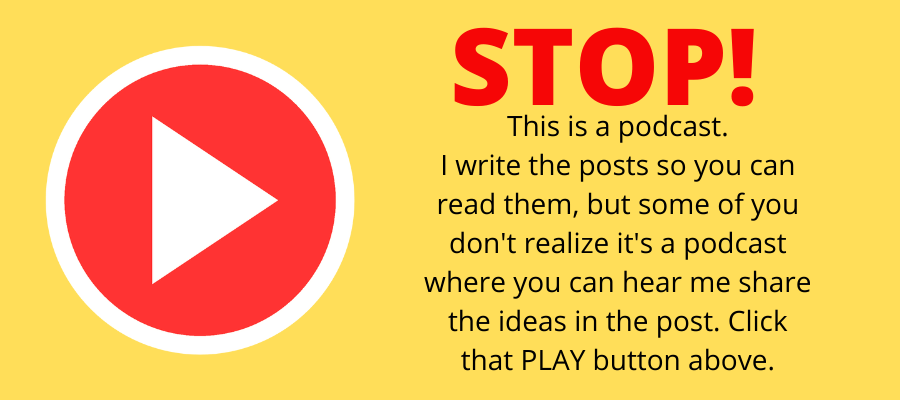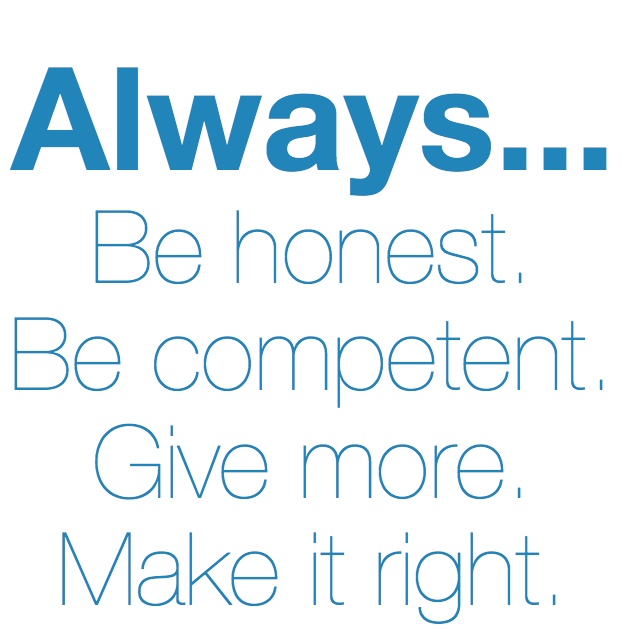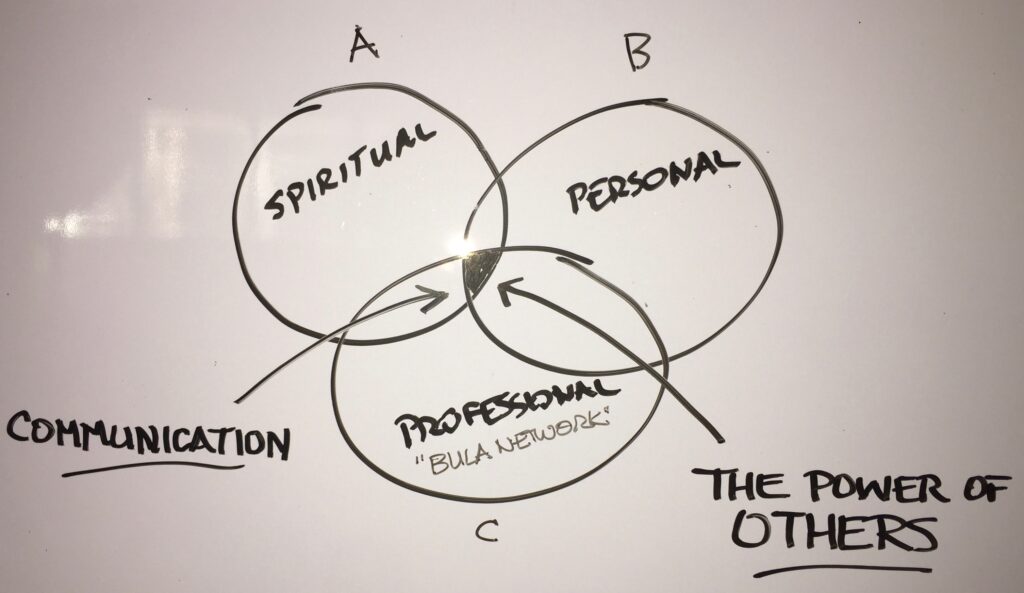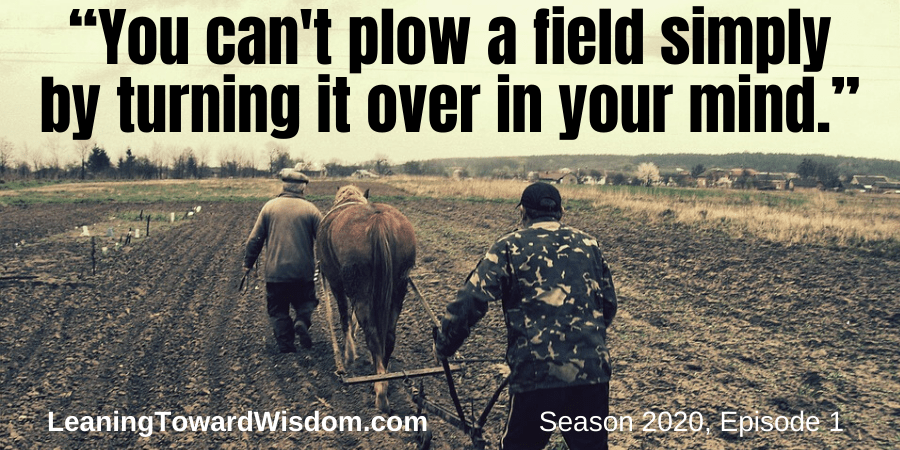Podcast: Play in new window | Download (Duration: 56:29 — 77.8MB)
Subscribe: Apple Podcasts | Spotify | iHeartRadio | Email | RSS | More

Welcome to a new season of Leaning Toward Wisdom. It’s season 2020. Surely a year of clarity – at least we hope so – for many of us.

I’ve got some new things in store for you this year. The first is something you’re hearing, a different microphone. It’s a mic made by a company I’d never heard of before (neither had anybody else), TechZone Audio Products. I won’t bore you with the minutia, but you’re hearing more details in my voice and I hope you find it even more pleasing than before. 😉
The biggest new thing centers around my new focus on the power of others. So intense is this urge to talk more about it, to incorporate it in all that I do…that I rebranded my “work” podcast into The Power Of Others. It was the Grow Great podcast.
I can’t think of a better way to begin this new season of Leaning Toward Wisdom than to talk about how important it is for us to help each other move forward and get things done. The pursuit of wisdom isn’t about just holding good, wise thoughts. It’s about making smart, wise choices that will affect our behavior. It’s about being better by doing better!
========================
“You can’t plow a field simply by turning it over in your mind.”
―
He was a famous religious leader, the 15th President of The Church of Jesus Christ of Latter-day Saints. Yes, I confess I had to Google that whenever I first read this quote. It’s among a list of quotes I rather like – quotes about doing things versus just planning to do things.
“The time to repair the roof is when the sun is shining.”
[State of the Union Address January 11, 1962] ― John F. Kennedy
Back in 1999 I read a book that distilled better than I ever could how I felt about doing things, The Knowing-Doing Gap: How Smart Companies Turn Knowledge into Action by Jeffrey Pfeffer and Robert I. Sutton. Many of us are prone to seek more knowledge. We think if we could just learn something more, then success would be certain. The nagging question is, “What if we just did what we already know we should do?” In other words, what if we closed that knowing-doing gap and moved forward doing what we already know.
There are untold thousands of people buying information and training every single day. Training and education they’ll never implement. I’ve long heard that fewer than 2% of any audience will deploy the things they learn from a public speaker or a trainer. And that may be a high estimate.
This also explains why ideas aren’t nearly as powerful as we may think. I still get tickled if somebody asks me to sign an NDA (non-disclosure agreement), which I refuse to do any more. People can protect their ideas like they’re gold when the reality is the gold is in doing something with that idea. Execution of the idea is where success is found.
Reminds me of that famous quote by head football coach John Mckay when he was coaching the upstart, expansion Tampa Bay Buccaneers. Talk about a man who could produce some of the funniest quotes!
In response to a question about his team’s execution, the head coach responded, “I’m all in favor of it.” 😀
“We didn’t tackle well today but we made up for it by not blocking.”
The coach was right. We all know it. You have to DO something. Thinking about it won’t get it done. Planning it won’t either.
“If you don’t know where you are going, you’ll end up someplace else.” ― Yogi Berra
“In preparing for battle I have always found that plans are useless, but planning is indispensable.” ― Dwight D. Eisenhower
I love to plan. I want to be prepared. And I’m prone to overthinking. Not enough to not act, but enough to get in my own way. But not about everything. Mostly the things that are incongruent for me. The things that don’t quite fit with who or what I am. Dirty Harry said, “A man’s gotta know his limitations.” I know mine. And I know my strengths. My overthinking leans hard in the areas where I know it’s not a natural fit for me…but I’m able to force myself to do it anyway. It doesn’t make me enjoy it or like it anymore though. It does make me work harder to figure out some better way. Experience has taught me how futile that is. I’m better off just walking away and refusing to do it. But that’s hard, too. I wrestle with it.
The Power Of Others
“Closer To Love” is a song by Mat Kearney that contains the lyrics, “We’re all one phone call from our knees.” We all have events that buckle our knees. Phone calls or conversations that blindside us.
Some months ago I was interviewing two ladies who work for Parents of Murdered Children, a non-profit serving friends and loved ones of murder victims. One of the ladies lost a daughter to murder. Sadly, it happens to far too many – a horrific example of a knee-buckling event. Thankfully, that organization is all about helping folks work through their grief to find a new normal. Things will never be the same, but we all have to battle through to find a new normal, a place where we can move forward.
It’s happened to me. Events and circumstances that lay us low. Loss. Bad change. Challenges that require time for us to wrap our brains around. Time to catch our breath and figure out, “Now what?”
It’s important that we work through it so we’re not stuck in only turning it over in mind. If we just think about it without getting on with plowing the field, then bitterness and rule our lives.
In April 1995 Bud Welch’s 23-year-old daughter, Julie Marie, was killed in the bombing of the Murrah Federal Building in Oklahoma City along with 167 others. In the months after her death, Bud changed from supporting the death penalty for Timothy McVeigh and Terry Nichols to taking a public stand against it.
Three days after the bombing, Bud watched Tim McVeigh being led out of the courthouse. He remembers wishing some sniper would kill the bomber. Bud would have done it himself if given the chance.
For the next 9 months or so Bud visited the bombsite daily and self-medicated with alcohol. Daily hangovers were a way of life now. Then on a cold January morning in 1996, he realized that what he was doing wasn’t working. Something had to change.
Over the next couple of weeks, it dawned on him that hatred and revenge had killed his daughter and the other victims of the bombing. Shortly after that, Bud started speaking out against the death penalty.
In December 1998 after McVeigh was sentenced to die for his crimes, Bud had the chance to meet McVeigh’s father and sister in Buffalo, Bill and Jennifer. The three of them sat in the kitchen together – family snapshots surrounding them on the wall. Included in the photos was one of a young high-school graduate, Timothy McVeigh. Bud couldn’t stop looking at it and observed to his dad and sister what a good-looking young man he was.
Bud wrote this…
“When I got ready to leave, I shook Bill’s hand, then extended it to Jennifer, but she just grabbed me and threw her arms around me. She was the same sort of age as Julie (his daughter) but felt so much taller. I don’t know which one of us started crying first. Then I held her face in my hands and said, ‘Look, honey, the three of us are in this for the rest of our lives. I don’t want your brother to die and I’ll do everything I can to prevent it.’ As I walked away from the house, I realized that until that moment I had walked alone, but now a tremendous weight had lifted from my shoulders. I had found someone who was a bigger victim of the Oklahoma bombing than I was, because while I can speak in front of thousands of people and say wonderful things about Julie. If Bill McVeigh meets a stranger he probably doesn’t even say he had a son.”
Six months after the bombing a poll taken in Oklahoma City of victims’ families and survivors showed that 85 percent wanted the death penalty for Tim McVeigh. Six years later that figure had dropped to nearly half, and now most of those who supported his execution have come to believe it was a mistake. In other words, they didn’t feel any better after Tim McVeigh was executed.
It’s the power of forgiveness, but it’s also the power of not simply turning it over in your mind. It’s the power of others – the power of plowing the field – putting in the work.
When problems – big, vexing problems – arise, what do you do?
Do you sequester yourself and try to go it alone?
Do you hide and hope a rescue team will come to save you?
Do you react with whatever impulses drive you in that moment?
My most recent big challenge erupted about a year and a half ago. It prompted me to assemble a group of four men, all of them gospel preachers. It was about life. Personal and spiritual. These men were all trusted advisors who spent countless hours helping me not just turn it over in my mind but helping me find the path forward so I could get back into the fields and begin plowing again.
These men challenged, encouraged, supported, questioned, exhorted and advised me along the way. Even though you can’t plow a field simply by turning it over in your mind…you can’t just hit the field and start plowing without first thinking about what you’re going to do. Or what you need to do to plow effectively. That’s where other people can really help us.
Each brought a unique perspective, but each helped me understand my best course of action to do what was right and based on what they felt was a wise choice. I made my own decisions, but they heavily influenced my journey and behavior.
It’s December 7, 2019, and I’m sitting at the funeral of one of my four advisors when the epiphanies hit me. A journey I’d been on – time spent turning things over in my mind – brought me to a point of clarity. Suddenly. After a few years. Funny how that happens.
Mat Kearney, that musician who wrote the song, Closer To Love, recalled the first time he heard himself on the radio. He described it like this. “I felt like I had emerged from a 5-year knife fight.” So much for those overnight success stories. Or those lightning bolt epiphanies that strike suddenly, after years of struggle.
I wish I could tell you exactly what prompted the epiphanies, but I’m not quite sure. I just know I was sitting there thinking of the friends I’ve lost through the years and thinking of my own mortality. And I suddenly got sick and tired of being sick and tired.
My first thought?
I don’t care what anybody thinks. I don’t care what anybody says. Almost instantly I asked myself a question, “Why have I not surrounded myself with other people to help me in the other areas of my life?” I had an immediate answer. “Because I don’t want to impose on people.”
Do you realize how incongruent those two epiphanies are? On one hand, I’m thinking, “I don’t care anymore.” Simultaneously I’m thinking about how I’ve avoided surrounding myself with helpful advisors in some areas of my life because I don’t want to impose. Proof positive how humans have hold two contradictory thoughts simultaneously.
It’s Saturday, December 7th, 2019 sometime after 2 pm in a funeral chapel of a small Oklahoma town. My eyes were filled with tears, but the fog was lifting in my mind. Even if I was holding two contrary thoughts. Thoughts I was deeming as epiphanies.
Let me add just a bit of context. Back in February 2019 a big part of my ordeal had come to a conclusion. Details don’t matter, but when some things wound down I found some new ambitions ramping up. I had divulged these two ambitions to my chief advisor and my wife. Nobody else knew. I kept it quiet because I was wrestling with what I described as a “nagging urge.” By the time I’m sitting in this funeral that ambition was about 10 months old, but I wasn’t resolved.
I bring this up because we’re talking about plowing or thinking about plowing. Those aren’t the same, but it doesn’t mean they’re completely disjointed. I’d been thinking quite seriously about something – we’ll call it plowing – for 10 months. But I wasn’t yet determined to go plow. I turning it over and over and over in my mind though.
“The body doesn’t know the difference between an experience and a thought, you can literally change your biology, neuro-circuitry, chemistry, hormones, and genes, simply by having an inner event.”
– Dr. Joe Dispenza
You should know something about me if you’ve not figured it out yet…Faith is THE THING. Spiritual things matter the most. God trumps everything because eternity changes everything. If this life were the only thing to fret about I might make different choices. But I believe the Bible. I believe in Judgment and eternity. And that makes all the difference in how we ought to approach this life. I’m not better than you. That’s not the point. I’m just being clear on what I hope to make the priority of my life.
Well, that part of my life has been a serious focal point, which prompted a 25-year-old me to move to a place where I could spend time and study with another old friend and preacher. For nine years we spent almost every Tuesday night studying the Bible together for hours. I wanted to learn more. Become a better Bible student. That friend passed away some years ago, but my time with him was priceless. Putting in the work spiritually has always been where much of my ambitions were directed. Only because the stakes are so high.
I was turning it over in my mind, but only in preparation for going into the field to begin plowing. I could feel inner changes happening and I’m supposing the prior 10 months before this funeral had brought me to a point where epiphanies were possible.
Epiphany, Part 1a
I don’t care. I’m unafraid of failure or embarrassment. It swept over me like I was in a hot shower. I can’t explain it. And at the risk of sounding like a jerk, I thought, “even Rhonda” (my wife of 42 years who I love more than any human on the planet). I don’t care what anybody thinks or says. I “think” I know what I want to do. What I need to do.
I’m an individualist. I’ve never followed the herd or felt any urge to. But I do want to be liked. I don’t intentionally behave caustically. I’d say I do care what others think – especially when it comes to reputation and doing the right thing. Just look at my professional mantra…

Yes, I do care what people think of me. In a certain context. But I’m a super fan of Will Rogers. And I rather like this quote.
“Too many people spend money they haven’t earned to buy things they don’t want to impress people they don’t like.”
I admit I have to work harder than I’d like to ignore what others may think or say – even people I don’t know or even like. Or respect. Over the years it’s gotten easier. But here I am, sitting with the other pallbearers on this Saturday afternoon and I’m fully committed. “I don’t care anymore,” I’m thinking. Yes, the Phil Collins’ song popped into my head later that day on the ride home.
Epiphany, Part 1b
Why haven’t I surrounded myself with people in other areas of my life…because I know firsthand the power of it in my spiritual life? Instantly, I knew the answer. I don’t want to impose on people.
Part of what I’d been planning and working toward was the launch of a professional peer advisory group of small to medium-sized business owners. Sitting there embracing my first epiphanies it dawned on me that a professional paid-for peer advisory group overcomes that feeling of imposition because all the members are united in one central thing – in the case of my offer, ThePeerAdvantage.com – the charter group are all going to be SMB owners. But there’s another big element. Every member is paying to be part of it, which means the feeling that you may be imposing on others is removed.
I regretted wasting so much time by not relying on people. People with whom I can feel safe. And I regretted caring too much what people think, especially people who don’t care about me, or people who don’t even really know me.
Monday morning, after the funeral – the first weekend of December 2019 – I walked into The Yellow Studio and drew a Venn diagram on my little whiteboard. You know what a Venn diagram is. It’s those circles you draw and find out where they all intersect – that one little space that they each have in common.

Epiphany, Part 2
Well, I drew three circles that represent the areas of my life, as I think about it: spiritual, personal and professional. I labeled the spiritual circle A because it’s first. Personal was labeled B ’cause it comes next and lastly, C was professional.
I did write some things inside circles A and B. Those aren’t important for this conversation though. I’d rather you think about what might go inside those circles for your own life.
Clarity.
A month had passed since the funeral in Oklahoma. Now, it was a new year and I was sitting at a new funeral. Another advisor reached the end of the line in this life. Three of my four spiritual advisors were now gone.
Those first epiphanies, like most epiphanies I think, involved resolve, but this was different. Deeper.
Real clarity fosters real resolve. You know the difference. There’s that clarity you think you have, then there’s the clarity you know you have. It’s a confidence thing.
It’s an anonymous quote most often attributed to Dr. Suess.
“Don’t cry because it’s over. Smile because it happened.”
That’s how I felt. I was so thankful for these men who surrounded me.
Circle A – the spiritual circle – has always been THE circle deserving the greatest focus and attention.
Epiphany, Part 3
Resolve.
Epiphany, Part 1a was not caring what anybody thought because I knew what I was thinking. I knew what I thought I wanted to do. Funny thing is I cared deeply what certain people thought, people with whom I was safest. People who I know cared about me being my best. And doing my best.
This part of the epiphany was mostly about not caring what the world or anybody else thought of me and whatever new ambitions I had. I certainly didn’t care the unsafe people who had populated my life. I was systematically ridding myself of them.
Epiphany, Part 1b was facing the reality that I had failed to surround myself with supportive, helpful people in two of my three circles: personal and professional.
Epiphany, Part 2 was distilling the ideas into these three circles depicting my life. I was pushing things forward. Getting more clear.
This is when I saw more clearly the two big areas of commonality: the power of others and communication. How else can we leverage the power of others without communication? I realized the big action areas of my life were now focused on these 2 big ideas. They intersected every circle of my life starting with this most important circle.
But there are two other circles on my Venn diagram. Each circle addresses the issue of today’s show – plowing versus thinking about plowing.
Let’s step back for a minute and think about YOU. I’ve shared all this not to be self-indulgent, but to share my vulnerability in hopes you’ll find the courage to be vulnerable in whatever it is you may want to do next.
It’s funny how that works. I’ve seen it often in groups. One person breaks the ice of the entire group by divulging some challenge or pain that has such an emotional impact on the group that everybody draws closer together. And one by one each person shows more of themselves to the group, helping forge the relationships to a whole new level of closeness.
I want this to serve to do that for you. I’m not saying it has to be with me, but I want to urge you to find somebody. Somebody with whom you feel safe enough to share. Somebody safe enough that you don’t question their intentions. Like my inner circle. People you know who only want your very best. People with no other agenda. People devoid of judging you or your ambitions (or your weaknesses, problems, and challenges), but people willing and able to share insights, experience, and wisdom so you can better figure it out for yourself.
Before I briefly move on beyond my A circle I want you to know one more detail. If you’re unfamiliar with the Bible story of the prodigal son, then you can turn to Luke chapter 15 and read it (verses 11 through 32). My urge is largely driven by how hard I believe it was for the younger son to go home. Home is where he belonged. That’s where all his good fortune was. He had left it all behind to live a horrible life. Until he found himself wasted and devastated. When he lost everything he came to himself and made up his mind to go home.
I know there are many people who would go home spiritually to live better, but it’s a hard thing. To face people who may judge you harshly. To face the shame and embarrassment of your poor choices. But it’s still the wise choice and I’m arrogant enough to know I can help people figure it out. I know because it’s work I’ve been doing for more than 20 years right here where I work and worship. I’m ready to find out if I might find a starfish or two out beyond my local scope who need a little boy willing to toss them back into the ocean where they belong. Where they can thrive.
Luke 15:11 And he said, A certain man had two sons: 12 and the younger of them said to his father, Father, give me the portion of 3thy substance that falleth to me. And he divided unto them his living. 13 And not many days after, the younger son gathered all together and took his journey into a far country; and there he wasted his substance with riotous living. 14 And when he had spent all, there arose a mighty famine in that country; and he began to be in want. 15 And he went and joined himself to one of the citizens of that country; and he sent him into his field to feed swine. 16 And he would fain 4have filled his belly with 5the husks that the swine did eat: and no man gave unto him. 17 But when he came to himself he said, How many hired servants of my father’s have bread enough and to spare, and I perish here with hunger! 18 I will arise and go to my father, and will say unto him, Father, I have sinned against heaven, and in thy sight: 19 I am no more worthy to be called your son: make me as one of thy hired servants. 20 And he arose, and came to his father. But while he was yet afar off, his father saw him, and was moved with compassion, and ran, and fell on his neck and 6kissed him. 21 And the son said unto him, Father, I have sinned against heaven, and in thy sight: I am no more worthy to be called thy son7. 22 But the father said to his 8servants, Bring forth quickly the best robe, and put it on him; and put a ring on his hand, and shoes on his feet: 23 and bring the fatted calf, and kill it, and let us eat, and make merry: 24 for this my son was dead, and is alive again; he was lost, and is found. And they began to be merry. 25 Now his elder son was in the field: and as he came and drew nigh to the house, he heard music and dancing. 26 And he called to him one of the servants, and inquired what these things might be. 27 And he said unto him, Thy brother is come; and thy father hath killed the fatted calf, because he hath received him safe and sound. 28 But he was angry, and would not go in: and his father came out, and entreated him. 29 But he answered and said to his father, Lo, these many years do I serve thee, and I never transgressed a commandment of thine; and yet thou never gavest me a kid, that I might make merry with my friends: 30 but when this thy son came, who hath devoured thy living with harlots, thou killedst for him the fatted calf. 31 And he said unto him, 9Son, thou art ever with me, and all that is mine is thine. 32 But it was meet to take merry and be glad: for this thy brother was dead, and is alive again; and was lost, and is found.
Circle B is personal. Inside that, I didn’t necessarily put the top things which would always be relationships. Family. Friends. For me, those are a given.
No, I wrote some things that were very focused on one of the big points of the intersection…communication.
Communication can be a one-to-many method, but it can also include a personal element of one-to-few or one-to-one. I’m fond of all of it, but I confess I’m mostly fond of the one-to-few or one-to-one deep conversations.
This podcast is communication. I know technically it’s a monologue, but it doesn’t feel that way to me. I don’t want it to feel that way to you either. It’s a conversation.
It’s a conversation because I know you can relate and understand. I know humans share far more than not. We’re more alike than we may realize. I know that. So I don’t feel like I’m the only one communicating here. You’re communicating because you click play. Sometimes you interact with me on social media or email. Sometimes we jump on a Skype call or a phone call. We’re in this together. This isn’t just about me. My stories are merely a means to an end. A way to make a point. A way to provoke thought. A way to provoke wiser choices and decisions. A way to prompt wiser behavior.
Communication isn’t about telling you what to do or what you should do. It’s about one big thing — helping you figure it out for yourself.
Keep in mind, we’re talking about putting in the work. Plowing the field as opposed to just thinking about and talking about plowing the field. This is future stuff that needs to be present tense stuff. It’s about moving forward so we can make our ideas, thoughts, and motives become present tense. It’s about making our thoughts become a reality.
Dr. Dispenza weighs in again. This time on how we can begin to make changes.
“So most people then wait for crisis or trauma or disease or diagnosis… they wait for loss, some tragedy to make up their mind to change. And my message is why wait? You can learn change in a state of pain and suffering or you can learn change in a state of joy and inspiration.”
“Turns out most people spend 70% of their life living in survival and living in stress, so they’re always anticipating the worst-case scenario based on a past experience and they’re literally…they’re selecting the worst possible outcome and they’re beginning to emotionally embrace it with fear and they’re conditioning their body into a state of fear.”
I admit that my forces for change were loss. Crisis. But it is what it is, right? Logically I know I should be more proactive. And do it positively instead of waiting for my hand to be forced. But I’m like you. We don’t focus on it until something forces us to.
What if we decided to give it the attention it deserves? Right now?
Professionally, I have a habit of asking people to divulge their present knowing-doing gap. I’ll ask them to tell me what they’re neglecting to do that they know they should be doing. Then I’ll ask them to tell me what’s holding them up. What’s the constraint preventing them from doing it?
Universally the answers will be something people have long known they should do. Mostly they admit that the only constraint is attention. Focus. They simply haven’t done it because they’ve neglected to make it the priority they claim it should be. In other words, they sometimes turn it over in their mind, but they just don’t get around to plowing the field.
The last circle is C, Professional. Inside that circle is the name of my company, Bula Network. All my occupational work falls under that banner. I won’t bore you with details ’cause you can go find that out on your own if you’re interested. Professionally, personally and spiritually it’s all congruent though. It’s all about those two big things: the power of others and communication.
The real higher-level thing is something else though. Something four men helped me do over the past couple of years, spiritually. It’s the last part of the epiphany.
Epiphany, Part 4
Helping people figure it out.
The tagline at my company website says –
Helping Leaders Make Better Decisions Faster | Helping People Leverage The Power Of Others
All 3 of these circles of my Venn diagram are about helping PEOPLE (not just leaders) make better decisions faster. Helping people fix what ails them. Helping people find their way back home. Helping people move forward past whatever adversity may have crippled them. That’s the driver behind every single thing. And as usual, that’s the lead that I so effectively buried.
Are there suppressed epiphanies that you need to realize today? Of course, there are. By now you know what’s standing in the way…YOU. We’re the problem. We’re also the solution. Part of our problem is our failure to move from our head to the field. And to move from the privacy of our thoughts to the conversations with others who can help us hit the field and turn over that soil where our wildest dreams can germinate and flourish.
========================
I’ll close by reciting once more the story that best illustrates the strongest desires of my heart. It speaks to the 3 big areas of my life and what I’d like to devote myself to for whatever time I have left on the planet.

saving starfish one at a time
Once upon a time, there was an old man who used to go to the ocean to do his writing. He had a habit of walking on the beach every morning before he began his work. Early one morning, he was walking along the shore after a big storm had passed and found the vast beach littered with starfish as far as the eye could see, stretching in both directions.
Off in the distance, the old man noticed a small boy approaching. As the boy walked, he paused every so often and as he grew closer, the man could see that he was occasionally bending down to pick up an object and throw it into the sea. The boy came closer still and the man called out, “Good morning! May I ask what it is that you are doing?”
The young boy paused, looked up, and replied “Throwing starfish into the ocean. The tide has washed them up onto the beach and they can’t return to the sea by themselves. When the sun gets high, they will die, unless I throw them back into the water.”
The old man replied, “But there must be tens of thousands of starfish on this beach. I’m afraid you won’t really be able to make much of a difference.”
The boy bent down, picked up yet another starfish and threw it as far as he could into the ocean. Then he turned, smiled and said, “It made a difference to that one!”
*adapted from The Star Thrower, by Loren Eiseley (1907 – 1977)

